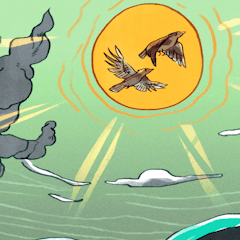
Articles on Climate change
Displaying 4701 - 4720 of 6819 articles

The risk of urban flooding is rising. Overall, residents and municipalities are ill prepared, but there are steps homeowners can take to protect themselves.

I analysed 15 million words written by major oil companies and found their usage of ‘climate change’ peaked a decade ago.

Effective conservation of migratory songbirds requires an understanding of how populations are connected between seasons. The challenge is being able to track individuals throughout the entire year.

Deriving fuel from trees costs more than wind and solar power and it emits more carbon than coal. There are many heated debates about this kind of energy, known as forest or woody biomass.

To give the best chance for science to have an impact, we need to present our arguments to the public in the most convincing ways we have available. Applied psychology can help.

Calgary has already had two 100-year floods in less than a decade. But the city and the province have yet to take action to meaningfully lower the risk of future flood damages.

Wild animals are hard at work this spring. Here’s how their hard labour benefits humans, and why we should be more appreciative.

A big rise in armed attacks in the Sahel - and the intensity of the attacks in recent years - is now seen as a major source of concern.

Climate change plans can bring broader benefits to cities, while helping avert disaster.

Australia has always suffered heat and flood, but a detailed seasonal rainfall reconstruction of the last 800 years shows the extremes are intensifying.

The Rose’s mountain toadlet adapts its breeding habits according to the weather.

It is misguided to blame armed conflict and violence on climate change alone.

Scientists have long thought most nitrogen in Earth’s ecosystems comes from the air, but new research shows it also is released as rocks weather. This could boost plant growth and help sequester carbon – but not fast enough to avert climate change, as some pundits have claimed.

At 14, writer Tony Birch had rarely travelled two miles out of the centre of Melbourne. Encountering a billabong on the Birrarung River was the first time that country spoke to him.

How to move beyond the warm words about tackling urban heat islands to doing something about them.

Climate change is transforming the Arctic, with impacts on the rest of the planet. A geographer explains why he once doubted that human actions were causing such shifts, and what changed his mind.

Some experts argue globalization has been bad for the environment. But moving away from globalization could have other consequences that could be even more devastating for the environment.

We looked at ten countries in East Africa and found poverty and politics were much more important drivers of conflict and displacement than climate change.

The 2017 hurricane season showed that Caribbean nations urgently need more resilient power grids. But the effects of climate change – including more severe storms – complicate the shift to renewables.

Fish are a key food source for millions of people worldwide. But a recent study finds long-term warming over the next 200 years could starve tiny plankton, with impacts that would ripple up food chains.
